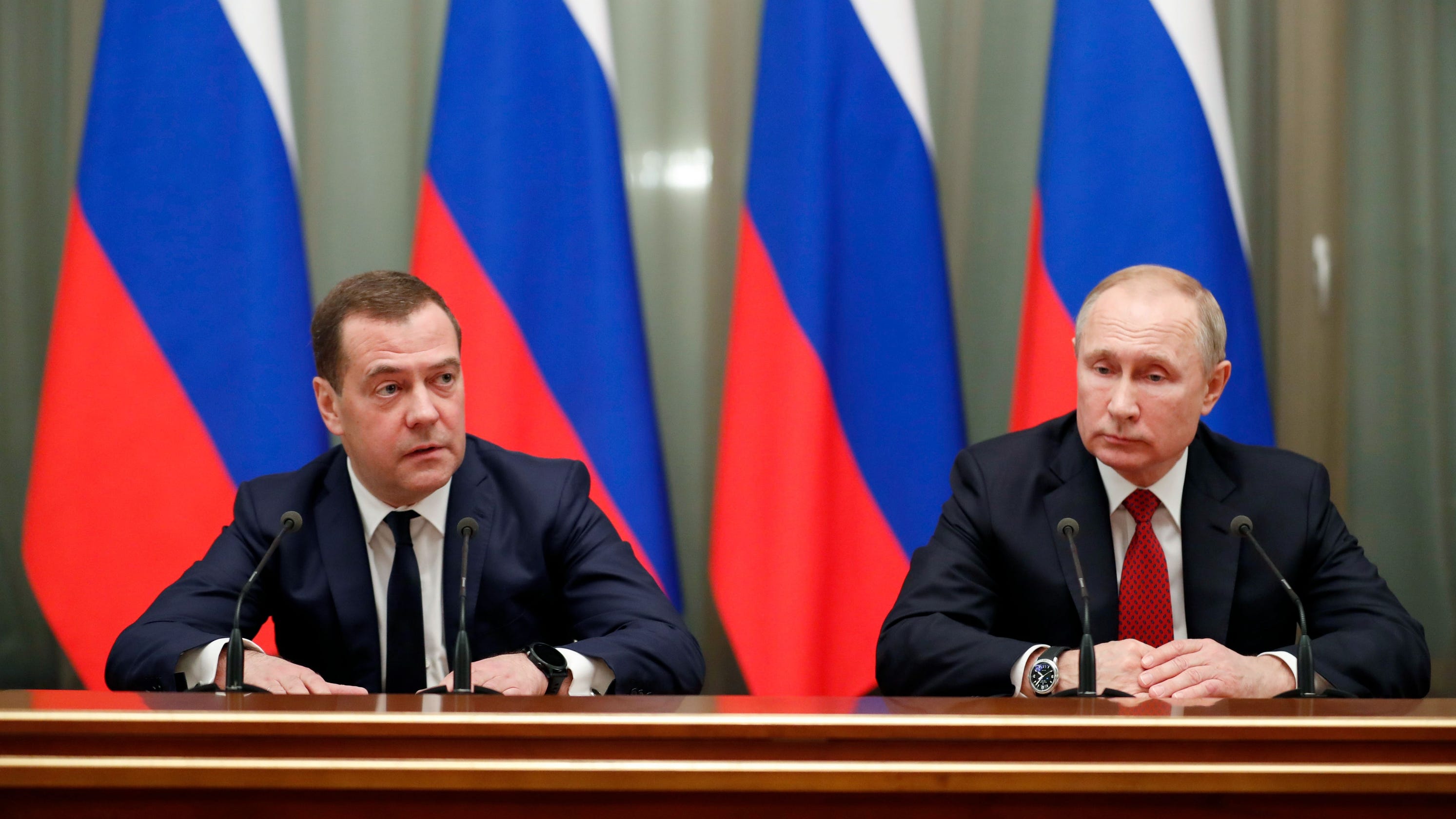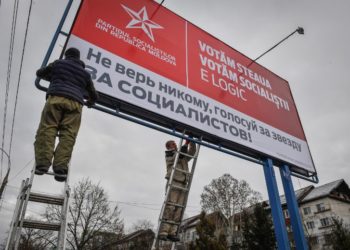Judging by international media reaction, Russia’s President Vladimir Putin shocked the world last week by announcing a series of reforms to the country’s Constitution. It’s not clear why so many observers of Russian politics were surprised.
It’s been widely known that a major watershed is coming up in 2024 when Putin is required to step down as president. It’s been equally obvious that Putin has been thinking about this, and a solution was always going to emerge from him sooner rather than later.
The fact that Putin announced the first steps towards the long-anticipated change shouldn’t surprise anyone. Putin and his aids in the Presidential Administration have had all the time they wanted to come up with a plan of what to do with the “2024 problem,” and they undoubtedly have a detailed strategy.
The problem for the rest of us is that no one knows exactly what their plan is.
Russian ‘Superpresidentialism’
The current Russian Constitution was adopted in December 1993 in the aftermath of a bloody armed conflict between President Boris Yeltsin and the Soviet parliament. As the winner in that conflict, Yeltsin tilted the balance of power overwhelmingly in favor of the presidency. Putin went even further by establishing control over remaining feeble centers of power such as the Duma, the regional governors, and the big business known as the oligarchs.
Yet, Putin has been strangely opposed to changing the Constitution to allow himself a permanent role as president, as many other post-Soviet leaders have. Simply removing term limits from the Constitution has always seemed too crude a way to maintain power. Putin consciously shied away from this in 2008 and certainly doesn’t want it to happen in 2024.

A temporary swapping of roles with his closest ally in 2008, when Dmitry Medvedev became a weak president with Putin as a strong prime minister, was clearly a one-off. It proved successful but far too risky a solution to try again.
Instead, Putin has chosen a new strategy. This seems to focus on dispersing political power more widely across various institutions, instead of having it almost entirely concentrated in the president’s office.
Putin’s Current Proposals
In the new proposals put forward by Putin, political authority will be divided between the president, who retains overall control of general policy direction and the security brief, and other collective institutions.
The Duma is expected to extend its powers to appoint the whole government instead of just confirming the president’s choice of a prime minister as it currently does. The Constitutional Court will be given new powers to strike down laws passed by the Duma.
The upper chamber known as the Federal Council will acquire the power to fire judges and to be consulted on key appointments to top security posts, a duty currently exclusively reserved for the president.
On top of all that, there are proposals for a formal, but yet undefined, role for the State Council (currently an advisory congregation of all regional heads and some top federal politicians) to be enshrined in the Constitution.
This looks like a much more elaborate plan compared to the simple swap of roles with Medvedev in 2008. And this time, the changes are intended to be permanent. To reinforce this sense of permanency, Putin promised a public vote to approve the proposals. This will make it much more difficult to unroll the changes by whoever ends up as president in 2024.
So, under these proposals, Russia will have much less concentrated authority. This is objectively a step in the right direction, even if it’s done for the wrong reason of preserving Putin’s power, whose precise role in this new configuration of power remains unclear.
Perhaps the clearest signal that the plans announced last week are a start of something fundamental was the sudden resignation of Putin’s closest political minion, the prime minister (and one-time president), Medvedev.
Plans for After 2024
Putin, born in 1952, will be almost at a prime age for a politician in 2024.
If you take the United States as an example, President Donald Trump is currently 73 years old, while potential Democratic party nominees Joe Biden and Michael Bloomberg are both 77, and Bernie Sanders 78. Only Elizabeth Warren stands out by her youth at the gentle age of 70. And yet, one of them is likely to be the president next year.
It’s hard to see Putin, who currently holds absolute power, surrendering it in four years when he’ll be only 71 years old.
The issue here is not whether or not Putin will leave power in 2024: he won’t. Instead, what is happening is Putin laying down the foundation for the eventual transition, which will take place in the decade or so after 2024.
This is how one Russian paper today interprets Vladimir Putin’s proposal to change the Constitution: “In Russia there will be a tsar. And everyone knows his name.” “Putin isn’t ready to leave power. The transition will be from Putin to Putin.” #ReadingRussia pic.twitter.com/QI1oj6eUZ2
— Steve Rosenberg (@BBCSteveR) January 17, 2020
It’s very tempting to see Putin following Chinese paramount leader Deng Xiaoping’s example, who retained power and influence well into his late 80s, even when resigning from formal posts. But to follow Deng’s model, Putin would need to have not only his successor in place but a designated successor’s successor too, as Deng had with Jiang Zemin and Hu Jintao. Of course, the system broke down with Xi Jinping’s rise to power in 2012, but that was years after Deng’s death in 1997 at the age of 92.
The key to Deng’s enterprise was ensuring his policies, captured in the phrase “peaceful rise of China,” survived long after its author’s death. Similarly, Putin undoubtedly wants his legacy, summed up in his expression “getting Russia off its knees,” to carry on long after he is no longer there. This requires putting in place institutional and personnel changes that will preserve the current course set by Putin for the long term.
New Government, Old Challenges
Putin’s choice for Mikhail Mishustin, the little-known head of the Federal Tax Agency, as the new prime minister is interesting. There is still plenty of time for an interim PM like Mishustin to kickstart the economy by implementing the necessary reforms, something which Medvedev has clearly struggled with, and then put in the true successor nearer to 2024.
The Financial Times dubbed Mishustin “Russia’s taxman of the future” now promoted to prime minister. Mishustin transformed the country’s notoriously corrupt and inefficient system into the world’s best one. For example, while the Russian economy grew 2 percent on average in the last decade, tax collection went up by 39 percent.
Russia: The State Duma (National Parliament) approved President Vladimir Putin's candidate and up to now Russian Federal Tax Service chief Mikhail Mishustin (*) as the new Prime Minister of Russia.
383 of the 450 MPs voted for the confirmation, 41 abstained, no one was against.
— Europe Elects (@EuropeElects) January 16, 2020
Western sanctions have put a strain on Russia’s economy. The authorities responded by pushing through some necessary reforms, previously long delayed because of their unpopularity.
The increase in retirement age and the VAT and greater budgetary discipline, including less money for the military, were part of the reason why Russia has been in such rude macroeconomic health. It runs large current account and budget surpluses, has one of the world’s lowest sovereign and corporate debts, and its inflation is at a historic low. Its Achilles hill is the slow growth of 1 to 2 percent per year and stagnant or falling real wages.
Russia’s Fate
The question remains why Putin has decided to do it all now. Four years is enough time to implement the changes, put the new system in place, and see it how it works.
Crucially, there will be Duma elections in 2021. Forcing the constitutional changes now means that the next Duma elections are already done on new principles of greater control over the government.
Putin’s notice of impending changes drew inevitable parallels with Russia’s first president Yeltsin. Both men were at an almost identical age 68 and 67 years old at the time of their big announcements.
The contrast between Putin’s proclamation of intended reforms – confident, powerful, and with plenty of time to spare compared to Yeltsin’s tear-shedding sudden resignation speech on New Year’s Eve in 1999 – couldn’t be greater.
The similarity in their age belies not just the contrast in their political fortunes but shows a different fate for Russia in the foreseeable future.
Disclaimer: The views and opinions expressed here are those of the author and do not necessarily reflect the editorial position of The Globe Post.




















